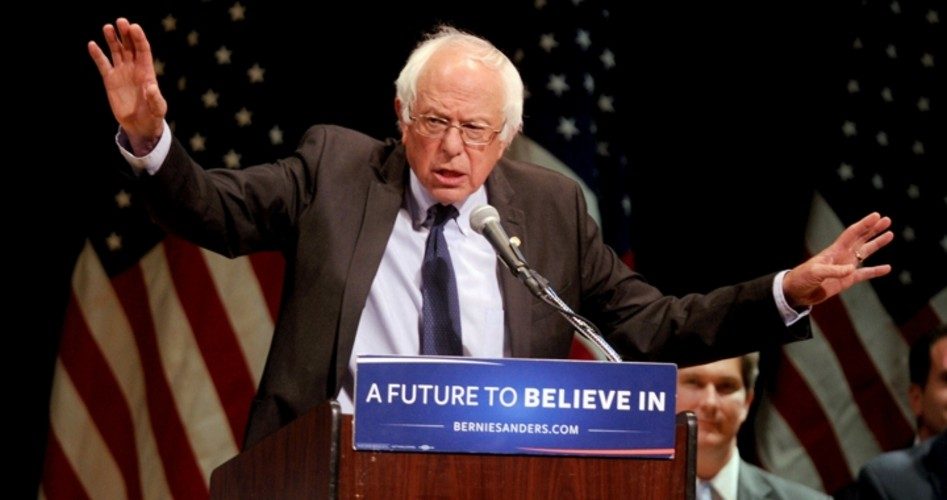
“I think the current occupant of the White House is an embarrassment to our country,” Senator Bernie Sanders (I-Vt.) said Tuesday morning in announcing he will seek the Democratic Party nomination for president a second time. Although not a member of the Democratic Party, Sanders ran a strong race for that party’s nomination in 2016, eventually losing to Hillary Clinton.
“I think he is a pathological liar,” Sanders said of President Donald Trump. “I also think he is a racist, a sexist, a homophobe, a xenophobe, somebody who is gaining cheap political points by trying to pick on minorities, often undocumented immigrants.”
In addition to his overt dislike of all things Trump, Sanders said his platform for 2020 will include universal healthcare (paid for by the taxpayers), a $15 minimum wage, and reducing student debt. In other words, a repeat of the socialist agenda he championed in his last presidential run.
Some political experts expect as many as 20 Democrats (if you count Sanders) will seek the Democratic Party nomination next year, even more than the 18 Republicans who sought that party’s nod in 2016. Five senators, in addition to Sanders, are entering the fray, including Cory Booker, Kirsten Gillibrand, Kamala Harris, Amy Klobucher, and Elizabeth Warren.
Sanders has some advantages — and some disadvantages — in comparison to his previous bid. He now has almost universal name recognition, always an advantage for a politician seeking any office. When he launched his campaign in 2015, he was at only three percent in the polls. Hillary Clinton was the presumed Democratic Party nominee, and few Democrats even dared to oppose her — even Vice President Joe Biden apparently saw it as hopeless.
Jeff Weaver, Sanders’ campaign manager, recalled the difficulties they had to overcome then, as opposed to a second run in 2020: “I think he has an opportunity to create a much more robust campaign infrastructure than we had last time when we were all running around, trying both [to] do a campaign and build the organization at the same time. So, there were a lot of unknowns last time which I think are known this time, and that does create a big difference.”
One big difference this time, however, that will work to Sanders’ disadvantage is that he is no longer the only alternative to Clinton. As Trump’s victory in the general election powerfully demonstrated, there are many Americans who simply do not like Hillary Clinton, and will vote for just about anyone running against her. The fact that Sanders garnered millions of votes in the Democratic primaries can partly be attributed to the fact that he was not Hillary Clinton.
Certainly, his brand of unadulterated socialism unfortunately does have an appeal to a large segment of Americans, especially in the Democratic Party. But, in 2016, when Clinton was asked to explain the difference between a Democrat such as herself and an avowed socialist such as Sanders, she really could not delineate any differences. In contrast to Sanders, Clinton may have appeared to offer a non-socialist Democrat choice, but there was little substantive difference.
This time, however, Sanders is not alone in espousing an overt socialist agenda. Weaver argued that this will rebound to Sanders’ credit, because he brought the progressive agenda to the Democratic Party. The again, multiple Democrats seem to be opting to drop the mask and come out as socialists, as well, reducing the chances that the 77-year-old Sanders can claim a monopoly on that designation. (Readers should note that “progressive” is largely just a more acceptable word for socialism.)
“He really has an established record,” Weaver insisted. “If he were to run for president and if he were to be successful, you know, people will have confidence that in fact he will follow through on the policy agenda that he has articulated for decades and decades.”
That is no doubt true, and is the very reason that Americans who value limited government and the free enterprise system will reject Sanders.
During his TV debate with Senator Ted Cruz (R-Texas) in October 2017, Sanders took offense when Cruz compared Sanders’ model nation of Denmark to Communist Cuba. Cruz quoted Ronald Reagan, who noted that the guns on the Berlin Wall all pointed the same way — against those who wanted to escape communism in East Berlin. He then added that the rafts were also going one way — leaving Castro’s Cuba — but no one got on a raft to escape to Cuba.
Sanders took umbrage, telling Cruz not to compare Denmark, a socialist “democracy,” to a totalitarian system such as Cuba.
But Sanders has also lauded Cuba, praising the late Communist dictator Fidel Castro for that island prison’s universal healthcare system and its regimented education system, which he said he would like to see implemented in America. Besides that, Sanders was a member of the Young People’s Socialist League in college, and he even flirted with communism itself, even taking his honeymoon in the old Soviet Union. Then, in the 1980s, Sanders was a featured speaker at a celebration of the Marxist Sandinista’s government in Nicaragua.
In regard to Denmark, Sanders insisted that Americans would be quite willing to pay the higher tax rates paid by that nation’s citizens, if only they knew about all the free stuff they would get in return — healthcare, education, daycare, and so on. Under grilling from Cruz, Sanders reluctantly admitted that all working Americans would pay higher taxes under his plan.
Sanders also strongly supported the continuation of the estate tax — which Cruz called “the death tax.”
But Sanders did indicate there was one area of the federal budget that he would be willing to cut — the military budget.
The unsettling thing about Senator Sanders’ run for president is that he now seems to be “mainstream” in the Democratic Party.
Photo: AP Images



